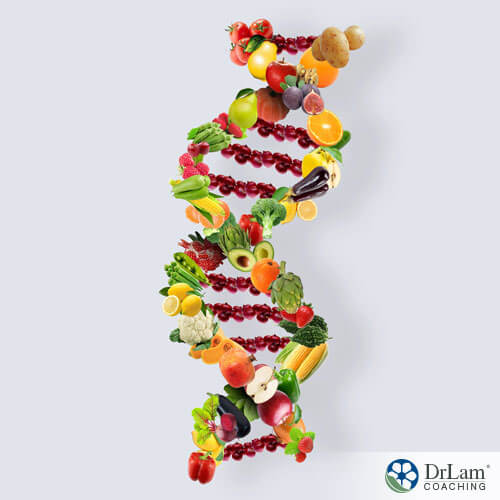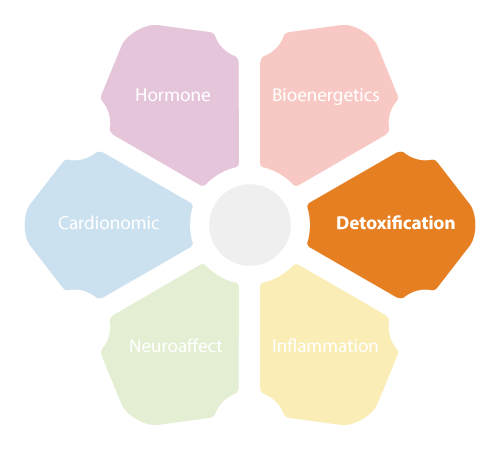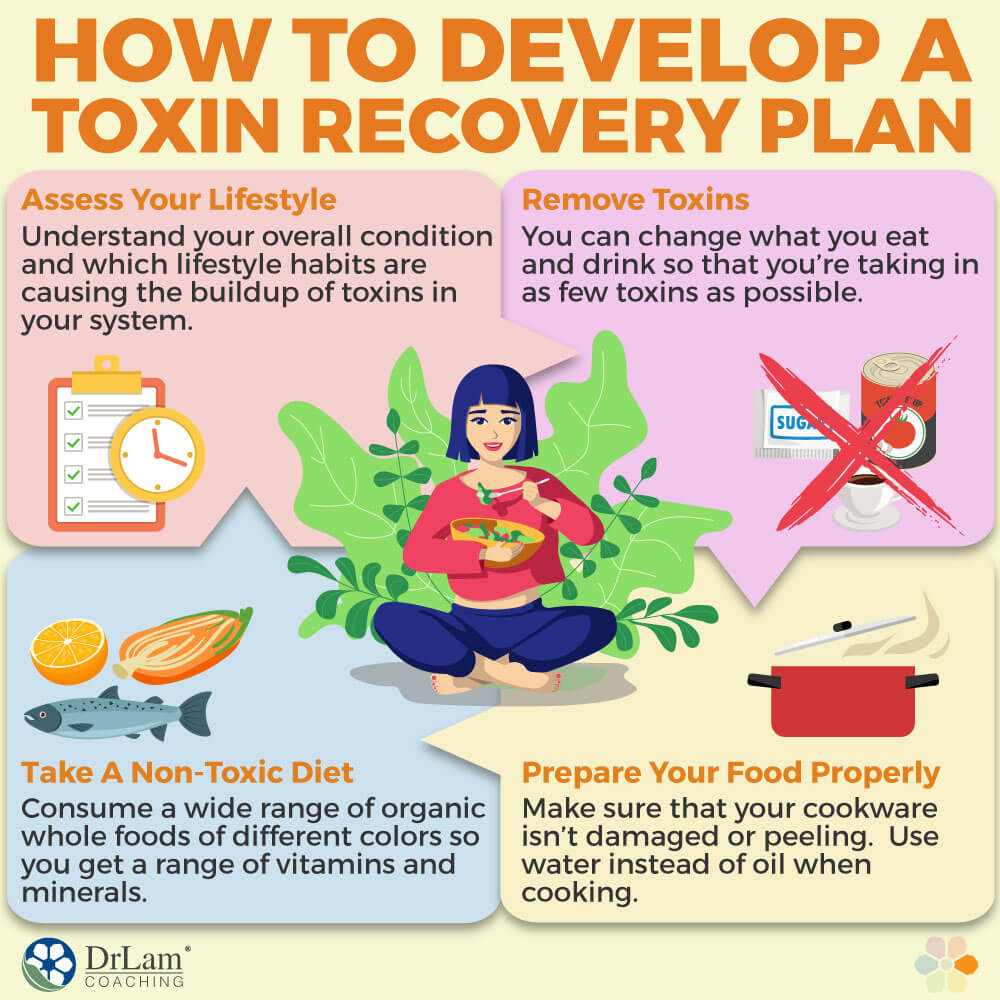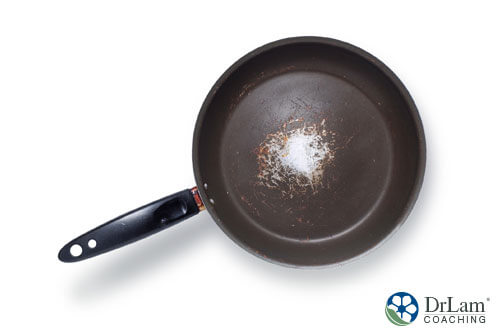 Even if you eat all the right things and live a healthy lifestyle, your body is still taking in toxins. Environmental toxins are always around us, and they can cause serious problems. For many years, it has been a mystery why two people who take in the same toxins will have two different reactions. One will get sick while the other remains in good health. However, this mystery may be explained by a recent link that research has unearthed between genetics and detoxification. Your body has its own ways of dealing with toxins that enter your system, and the efficiency of these processes may be determined by your genetics. This is important information for healthy people and for people who have Adrenal Fatigue Syndrome (AFS), which can be caused or exacerbated by toxins and the body’s inability to detoxify itself.
Even if you eat all the right things and live a healthy lifestyle, your body is still taking in toxins. Environmental toxins are always around us, and they can cause serious problems. For many years, it has been a mystery why two people who take in the same toxins will have two different reactions. One will get sick while the other remains in good health. However, this mystery may be explained by a recent link that research has unearthed between genetics and detoxification. Your body has its own ways of dealing with toxins that enter your system, and the efficiency of these processes may be determined by your genetics. This is important information for healthy people and for people who have Adrenal Fatigue Syndrome (AFS), which can be caused or exacerbated by toxins and the body’s inability to detoxify itself.
The world is full of environmental toxins. These toxins are in the food you eat, the air you breathe, and the water you drink. Toxins are compounds that damage cell function or structure, and some of them can have a cumulative effect, which means that you won’t know about the problem until the damage is already done.
If it weren’t for the body’s detoxification processes, your body would be overwhelmed with toxins. Fortunately, these processes operate constantly to rid the body of the damaging compounds. But these processes, and every other process in the body, also create toxins called metabolites. So if you’re exposed to too many toxins, the detoxification process itself will cause increased toxicity and may even result in your body struggling to detoxify itself. And this is where the real problems start.
There are several factors that determine whether toxins become a health issue, including the link between genetics and detoxification. These factors include:
The link between genetics and detoxification isn’t fully understood because there isn’t a lot of strong research or clinical data on the issue. However, it is understood that Single Nucleotide Polymorphisms (SNPs) may be a key factor in this relationship. SNPs are the most common type of genetic variant in humans. They are a very small type of genetic variant, representing a difference in a single DNA building block or nucleotide.
This type of variation occurs nearly once in every 1,000 nucleotides, which means that you probably have around 4 to 5 million SNPs in your DNA. SNPs can occur in the DNA between genes, which means they’ll have a weaker effect on your body, or within a gene, which means they’ll play a more direct role in how the gene functions. Most of the time SNPs are harmless, though some may determine your risk of certain diseases or drug sensitivities. And even more essential to the link between genetics and detoxification, certain SNPs can also determine or influence your susceptibility to environmental toxins.
When it comes to genetics and detoxification, there are several issues directly related to SNPs that you need to understand. These are:
The importance of considering the link between genetics and detoxification comes to light when SNPs occur in the Cytochrome P450s (CYPs). These are enzymes that are found in tissues throughout the body and work to metabolize toxic compounds. Unfortunately, these functions can be changed or hindered by SNPs. In these cases, studies on rats have shown that good nutrition is essential. Profound nutritional deficiencies can lead to a further decrease in the activity of certain CYPs and lead to further problems with detoxification.
 Detoxification is usually split into two physiological phases, and this has an important impact on the link between genetics and detoxification. Each of these phases is identified by different classes of enzymes which are essential for the detoxification processes.
Detoxification is usually split into two physiological phases, and this has an important impact on the link between genetics and detoxification. Each of these phases is identified by different classes of enzymes which are essential for the detoxification processes.
Phase I involves the reduction of the toxin, usually by adding an oxygen molecule, and it is performed by the Cytochrome P450 enzyme.
During phase II detoxification, the liver adds additional chemicals to the toxins to make them harmless. This process also makes the toxins water soluble so they can be easily excreted from the body.
For this second phase to work properly, certain enzymes are required such as amino acid transferases, UDP-glucuronosyl transferases, N-acetyl transferases, methyltransferases, and glutathione S-transferases. Good nutrition is essential for the production and function of these enzymes. And this is just one of the ways that nutrition supports the detoxification process.
If you need to detoxify your body and improve your health, then you need to balance and support both of these detoxification phases. This can be quite difficult and requires a precise balance of nutrients. If you get it wrong, it’s possible that the first phase will become faster than the second, which means that toxins processed by phase I will be left in the body. Because after phase I, the toxins are in an even more harmful state, this will do a lot of damage to your body and its systems, increase your stress levels, contribute to the general toxicity of your body, and worsen AFS.
This is why it is important to get expert help before you start detoxifying so that you can ensure that you’re getting everything you need to support both phases. For those suffering from adrenal fatigue, it is even more important that you get expert help, as the detoxification phases with AFS tend to be more imbalanced than a normal person. Undergoing a detox while in adrenal fatigue recovery could also put further stress on your body, worsening the situation rather than helping it.
You can’t control the toxins in your environment or the impact of the connection between genetics and detoxification. But you can control how you nourish your body to fight off the toxins. If your diet is poor, then your body won’t have the nutrients it needs to effectively eliminate dangerous toxins. Here are just some of the ways that good nutrition can protect against toxicity:
This need for good nutrition during detoxification is why so many detox diets fail or just make the problem worse. Detox diets that severely restrict nutrient intake, such as juice cleanses or fasts, can cause low energy levels and nutritional insufficiency. This can result in issues such as low blood sugar levels, vitamin and mineral deficiencies, electrolyte imbalances, and even death. And if you’re already suffering from toxin overload, this will increase your stress levels, which will increase the amount of toxins that your body produces, making the problem even worse.
That’s why, when you’re looking to detox, you need to focus on eliminating foods that contain toxins and other harmful elements while focusing on nutrient-dense, healthy foods. This is even more important if you have disorders such as AFS, which can be caused or exacerbated by toxicity in the body.
When toxins build up in your body to the point where they start to overwhelm the Detoxification circuit, it can cause or exacerbate AFS. In this situation, the body starts to struggle to eliminate the toxins, which causes the detoxification processes to go into overdrive. The result is an overproduction of metabolites, which cause additional toxicity in the body and make the original situation even worse. This can cause imbalances in the Detoxification circuit, which is often a key complaint of people with AFS.
 AFS occurs when the body is under stress for a long period of time. This causes the NeuroEndoMetabolic (NEM) Stress Response to be active continuously. The NEM stress response is designed to be active for short periods to help the body cope during temporary periods of stress. But because stress tends to be ongoing in the modern world, usually due to work, relationship, and home pressures, it can cause problems.
AFS occurs when the body is under stress for a long period of time. This causes the NeuroEndoMetabolic (NEM) Stress Response to be active continuously. The NEM stress response is designed to be active for short periods to help the body cope during temporary periods of stress. But because stress tends to be ongoing in the modern world, usually due to work, relationship, and home pressures, it can cause problems.
The NEM stress response prompts the adrenal glands to release cortisol, the hormone that causes the fight or flight response. When the demand for cortisol is ongoing, the adrenal glands can become fatigued, which can result in imbalances throughout the body and ultimately lead to adrenal fatigue.
Detoxification is vitally important when you have AFS. Ongoing stress causes a build-up of toxins in the body which can damage your organs, unbalance the body’s circuits, and cause additional stress. However, detoxifying can be very difficult when you have AFS, both because of the overload of toxins throughout your system and because of the problems that AFS causes with the Detoxification circuit. In AFS, there is a very delicate balance between too much and too little detoxification, and consulting with a health coach who specializes in adrenal fatigue can help your body walk this fine line.
When environmental toxins enter the body, the Detoxification circuit responds to try to expel the harmful compounds. There are three systems in this circuit, all of them working together to clear the body’s systems and organs of harmful substances. These three components are the liver, the immune system, and the interstitium. The interstitium consists of the fluid-filled pockets between the organs, the skin, and the cell walls and includes the extracellular matrix (ECM), or the fluid-filled spaces between the cells. So when you’re talking about genetics and detoxification, you’re referring to how your genetic make-up influences the development and efficiency of these three systems.
When toxins enter the body, the immune system and the interstitium are instantly affected. The immune system produces inflammation, which is designed to expel the invaders from the body. The toxins often collect in and are transported through the body using the interstitium, which consists of the spaces between organs and the skin as well as the ECM. When this occurs, the inflammation does help to remove some of the toxins, which are then moved to the liver for excretion. But when the immune system is activated in order to produce inflammation, it also increases the production of metabolites. And if the inflammation becomes chronic because of ongoing toxicity or because of AFS, the inflammation itself becomes damaging as well. Chronic inflammation has been implicated in several disorders such as cancer and autoimmune disorders. That’s why this state can be so harmful to your body and to your health overall.
When inflammation becomes chronic, it can start to cause dysfunctions and imbalances throughout the Detoxification circuit. The body becomes increasingly toxic, which increases inflammation and metabolite production, and the interstitium becomes clogged with these toxins. And meanwhile, the liver becomes overloaded and is unable to expel all the harmful substances. This leads to a variety of debilitating symptoms that are difficult to assign to any particular disorder or disease but are characteristic of AFS.
But toxins don’t have to come from outside of your body to have this effect. Stress naturally causes toxins to accumulate in your body and activates the Detoxification circuit. And when stress becomes chronic and results in adrenal fatigue, the Detoxification circuit is often one of the first systems in the body to become unbalanced. This type of imbalance causes a toxic build-up throughout the body and makes the situation worse. The only way to correct this kind of imbalance is to reduce your stress levels and detox your body so that it can start to heal.
 The processes by which detoxification occurs are extremely complex, and they’re often controlled and influenced by the link between genetics and detoxification. Although the basic processes are the same, everyone’s body is different, which means that your body has a different capacity for toxins and a different level of flexibility and effectiveness when it comes to detoxification. Basically, this means that your body may be more or less able to cope with increases and decreases in toxin levels and may start to struggle when other people don’t even notice a difference. And your body may also struggle more when it comes to re-establishing balance in the Detoxification circuit as well. It all depends on how your genetic makeup influences the processes.
The processes by which detoxification occurs are extremely complex, and they’re often controlled and influenced by the link between genetics and detoxification. Although the basic processes are the same, everyone’s body is different, which means that your body has a different capacity for toxins and a different level of flexibility and effectiveness when it comes to detoxification. Basically, this means that your body may be more or less able to cope with increases and decreases in toxin levels and may start to struggle when other people don’t even notice a difference. And your body may also struggle more when it comes to re-establishing balance in the Detoxification circuit as well. It all depends on how your genetic makeup influences the processes.
This will be a very important element in your battle against AFS. The link between genetics and detoxification could determine whether you develop AFS when others wouldn’t and even hinder your recovery process. You can’t change your genes, but you need to be aware of their influence on your physical condition and ensure that your recovery plan is unique and designed for you and your body.

Detoxifying your body and getting rid of toxins is a good way to improve your health overall and help AFS. Lowering your toxin levels lowers your body’s stress levels, which may help your body heal some of the damage and start to re-balance its systems once more. However, a one size fits all plan won’t work here. Your body is different than everyone else’s. Your condition, your symptoms, your environment, and your genetics are all different. And the link between genetics and detoxification highlights the fact that those differences must be taken into account to improve your health.
This individual approach is an important element of AFS recovery as well. An individualized recovery plan is essential given the uniqueness of everyone’s situation. Rather than taking a one size fits all approach, finding a health coach who can help you develop an individualized recovery plan specific to your body is essential in your AFS recovery.
The first step to detoxification is understanding your overall condition and which lifestyle habits are causing the buildup of toxins in your system. This will help you understand how much of the problem is due to the link between genetics and detoxification, and how much of it is because of lifestyle choices that you can change. Consider:
All of this information is important, but your diet is one of the most vital parts. You need to assess everything you’re eating to determine if it’s helping or hurting your detox and your body. This can be difficult, as the rules about healthy and unhealthy food change all the time. You may need the help of a trained, experienced medical professional who understands your condition as a whole and can help you assess your nutritional intake while taking into account your AFS and toxin levels.
After you’ve identified all the sources of toxins in your diet it’s time to remove the ones you can. Obviously, you can’t reduce or eliminate the threats created by the link between genetics and detoxification, but you can change what you eat and drink so that you’re taking in as few toxins as possible. Some of the things you should try to eliminate include:

By removing as many toxins as possible from your life, you will decrease the amount of work that your detoxification processes must do. And this will decrease your body’s stress levels and help to rebalance the Detoxification circuit. Without the constant influx of toxins, your body’s natural processes will be able to start reducing the toxins that have built-up and AFS symptoms should start to reduce.
Improving your diet is the first step towards lowering your toxin levels and encouraging your body to heal itself. Just be careful when you start making these changes. Everyone’s body is different and changes that help other people may cause sensitivities or other problems that damage your health. So when you start this process, make sure that you have the help of a medical professional who’s aware of the dangers of environmental toxins, the link between genetics and detoxification and how it may affect your process, and the problems and issues associated with AFS. And if you notice any adverse effects from any of the changes you make, stop immediately and seek expert help.
Here are some of the foods that will aid you in your detox efforts to support phase I detoxification:
Eating according to the body’s natural rhythms is also vital as it will help support you during the times when your body needs the most energy to function at its best. This can be highly individual, so make sure you may need to do a lot of research to determine your body’s rhythms.
How you prepare your food is almost as important as what you eat. Here are some guidelines for preparing your food so that it supports your detoxification efforts: 
It’s best to get all the vitamins and minerals you need from the food you eat. However, this can be nearly impossible, particularly if you have deficiencies that need to be corrected or if you struggle to absorb certain nutrients correctly. In these cases, supplementation can be a good idea. However, if you have AFS then be careful. AFS often causes paradoxical reactions to supplementation, which means that your body may react badly to the influx of nutrients due to problems in the Detoxification circuit, causing an increased load of metabolites. And if this occurs it will set back your progress and worsen your condition. So only add supplements carefully and with the assistance of someone who’s aware of the effects that AFS can have on the body.
Supplementation should only occur in certain circumstances. If you have a toxic job or hobby, are under stress, or have your detox processes affected by SNPs and the link between genetics and detoxification, then supplementation may help. Some of the more helpful supplements for phase I detoxification include:
Again, make sure you get expert help before you add any of these to your detoxification plan to avoid further damage or paradoxical reactions as a result of your AFS.
It’s important that you support both phases of the detoxification process if you want to effectively clear toxins from your body. This is even more important if you have SNPs that impact phase II detox enzymes. You will only know about this if you work with a trained, experienced professional who’s aware of the importance of the link between genetics and detoxification, so make sure you get this kind of help before you start this process.
Supporting the first phase of detoxification but not the second will probably cause further imbalances in the Detoxification circuit. This can exacerbate your AFS and increase the toxicity of your body. Providing nutritional support for phase II detoxification means providing nutrition that’s specifically tailored to the enzymes and processes that are affected by your unique combination of SNPs.
In phase II detoxification, here are some issues that may impede the processes:
When talking about detox, a lot of people forget about the elimination side of the process. But ensuring that your body can rid itself of deactivated toxins in a timely manner is essential. This is even more important if you have AFS, which often causes bouts of diarrhea and constipation. To avoid this, you need to ensure that your food intake is supporting your elimination processes. Here are some effective strategies that will help with that: 
You need to be careful when you have AFS and you’re trying to improve your elimination. Increasing your fiber intake can cause problems with your bowels, particularly if you’re already prone to diarrhea. As with all of these strategies, it’s best to have the help of someone who’s aware of the symptoms associated with AFS. And if you notice any adverse symptoms, stop what you’re doing and look for ways to support your elimination without causing additional stress to your body.
The link between genetics and detoxification makes one thing abundantly clear. One size fits all programs that are designed to improve your health won’t work. The unique combination of inherited characteristics that determine how your body detoxifies itself and how it copes when under pressure from environmental toxins means that what works for you probably won’t work for everyone else. So if you’re concerned about your health because of AFS or any other issues, then you need the help of a properly trained and experienced medical professional who understands that your body and situation is unique. By implementing a health plan that’s tailored to your body and condition, you have the best chance of seeing an improvement in your health and alleviating AFS symptoms.
© Copyright 2020 Michael Lam, M.D. All Rights Reserved.
Toxicity from environmental toxins is a serious problem today and it isn’t always easy for the body to rid itself of the contaminants. There’s a strong link between genetics and detoxification that often determines how well your body copes with and excretes toxins.
